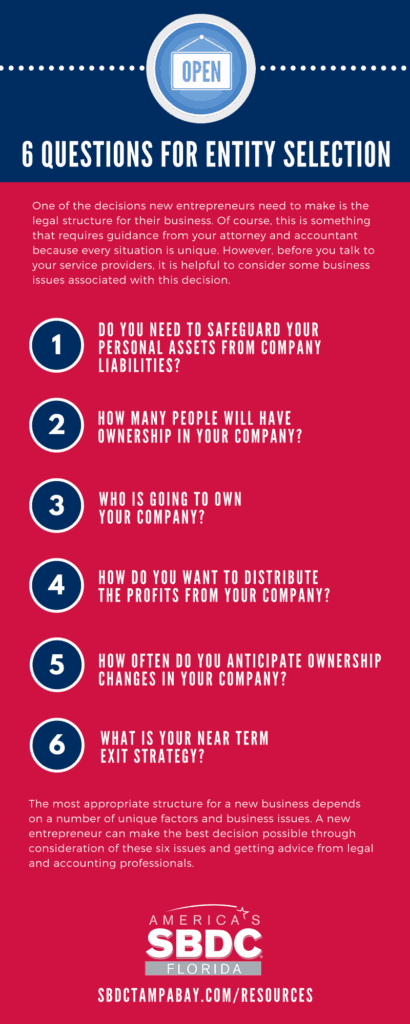6 Questions to Consider Before Selecting an Entity for Your Business

 by Mitch Lairmore | August 17, 2018
by Mitch Lairmore | August 17, 2018
One of the decisions new entrepreneurs need to make is the legal structure for their business. Of course, this is something that requires guidance from your attorney and accountant because every situation is unique. However, before you talk to your service providers, it is helpful to consider some business issues associated with this decision.
Below are some of the issues/questions you need to consider.
- Do you need to safeguard your personal assets from company liabilities? If you do, then you will likely need to incorporate your business because sole proprietorships do not provide any protection for the owner’s personal assets. The incorporation alternatives in the State of Florida are LLC and Florida profit corporations. An entrepreneur will also need to decide how the LLC or corporation will be taxed. Florida profit corporations can be taxed and structured as C Corporations (C Corp) or S Corporations (S Corp). LLCs can be taxed as a corporation, partnership or as part of the owner’s tax return (disregarded entity).
- How many people will have ownership in your company? S Corps have an upper limit on the number of owners. According to the IRS, in order to qualify for S Corporation status your company can have no more than 100 shareholders. If you intend to only have one owner or “member” for your company then a LLC structure can be disadvantageous. The protection of personal assets afforded by the LLC structure is different for single owner LLCs than LLCs with multiple owners.
- Who is going to own your company? Owners of S Corps can only be individuals, certain trusts and estates. S Corp shareholders must be U.S. citizens. LLCs and C Corps do not have restrictions on the number of owners or nationality of the owners.
- How do you want to distribute the profits from your company? The profits of S Corps are distributed based on ownership. Therefore, someone who owns 50 percent of the company will get 50 percent of the profits. In contrast, LLCs allow the owners to distribute profits in any way they choose. For example, a person who owns only 10 percent of a LLC can get 50 percent of the profits. This may make sense if that owner contributes more of his/her time to the business than the other owners.
- How often do you anticipate you will change ownership in your company? In general, it is easier to transfer ownership in an S Corp than a LLC because LLC ownership changes require approval from the current owners (members). C Corps can offer more ownership options than S Corps. For example, S Corp can only offer one class of stock, where C Corps can offer multiple classes such as preferred stock and common stock.
- What is your near term exit strategy? C Corps must distribute profits as dividends that are subject to corporate tax. The dividends are then treated as income to the owners who then pay personal tax. If you anticipate that the business will reinvest profits instead of paying dividends then the “double taxation” is less of an issue. A C Corp structure is the most amenable to attracting new investors so if you are planning to focus on building the value of the business and selling it, then a C Corp might make sense. C Corps are the most desirable if you plan to attract new investors, solicit foreign ownership and/or become a publicly listed company. If, on the other hand, you want to take money out of the business as earnings then an S Corp or LLC would allow you to take owner distributions without paying the corporate tax.
The most appropriate structure for a new business depends on a number of unique factors and business issues. A new entrepreneur can make the best decision possible through consideration of these six issues and getting advice from legal and accounting professionals.




